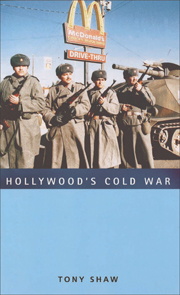Book contents
- Frontmatter
- Contents
- Acknowledgements
- List of Abbreviations
- Introduction
- 1 Love and defection
- 2 The enemy within
- 3 Projecting a prophet for profit
- 4 Of gods and moguls
- 5 Negotiable dissent
- 6 Turning a negative into a positive
- 7 A cowboy in combats
- 8 Secrets and lies
- 9 The empire strikes back
- Conclusion
- Bibliography
- Film Index
- General Index
3 - Projecting a prophet for profit
Published online by Cambridge University Press: 05 August 2013
- Frontmatter
- Contents
- Acknowledgements
- List of Abbreviations
- Introduction
- 1 Love and defection
- 2 The enemy within
- 3 Projecting a prophet for profit
- 4 Of gods and moguls
- 5 Negotiable dissent
- 6 Turning a negative into a positive
- 7 A cowboy in combats
- 8 Secrets and lies
- 9 The empire strikes back
- Conclusion
- Bibliography
- Film Index
- General Index
Summary
Communism believes that human beings are nothing worse than somewhat superior animals … and that the best kind of world is that world which is organized as a well-managed farm is organized, where certain animals are taken out to pasture, and they are fed and brought back and milked, and they are given a barn as shelter over their heads … I do not see how, as long as Soviet Communism holds those views … there can be any permanent reconciliation.
US Secretary of State John Foster Dulles to the Senate Foreign Relations Committee, 15 January 1953If proof were needed that literary images could play as important a role in the cultural Cold War as those viewed at the cinema, it can be found in the work of the British writer George Orwell. By the time of his death from tuberculosis at 46 years of age in January 1950, Orwell was regarded by many as the finest political writer in English since Jonathan Swift. Two generations later, many would class him as one of the most influential political writers of the twentieth century, and, paradoxically given his early demise, a key player in the East—West information war. Inspired by democratic socialist principles, Orwell's writing was interwoven to an unusual degree in British fiction with a European and internationalist view of history and politics. This feature, together with a characteristic unadorned style (‘good prose is like a window pane’, Orwell claimed), was most clearly illustrated by his two literary masterpieces, Animal Farm (1945) and Nineteen Eighty-Four (1949).
- Type
- Chapter
- Information
- Hollywood's Cold War , pp. 72 - 102Publisher: Edinburgh University PressPrint publication year: 2007



